Popular Patristics Series, Part 1 (10 vols.)
Digital Logos Edition
Like what you see? Be sure to also check out Popular Patristics Series, Part 2 (10 vols.).
Overview
The Popular Patristics Series (10 vols.) provides readable and accurate translations of a broad range of early Christian literature to a wide audience—from students of Christian history to lay Christians reading for spiritual benefit. Recognized Patristic scholars provide short but comprehensive and clear introductory essays according to their specializations for each volume. Texts include classics of Christian literature, thematic volumes, homily collections, letters, spiritual guidance, and poetical works from a wide variety of geographical contexts and historical backgrounds. The purpose of the series is to mine the riches of the early church and to make these invaluable writings available to all.
With the Logos Bible Software edition, you can reap the maximum benefit from the Popular Patristics Series (10 vols.) by getting easier access to the contents of the collection—helping you use these volumes more effectively for scholarly pursuits, sermon preparation, or personal study. Every word from every book is indexed and catalogued to help you search the entire series for a particular verse or topic. For example, you can search the letters written by St. Cyprian for every instance of the word “baptism.”

- Examines the work of the early church to show the solid foundation current belief rests on
- Provides accurate translations of early Christian literature
- Includes extensive introductions and bibliographies
- Title: Popular Patristics
- Publisher: St. Vladimir’s Seminary Press
- Volumes: 10
- Pages: 1,626
- Christian Group: Orthodox
- Resource Type: Ancient Texts
- Topic: Christianity
This title is included in the following collections
You can save when you purchase this product as part of a collection.
Logos 9 Orthodox Bronze Legacy...
$89.99$89.99Popular Patristics Series (20 ...
$248.80$199.99Logos 8 Lutheran Silver Legacy...
$349.99$349.99Logos 8 Orthodox Silver Legacy...
$349.99$349.99
- $349.99
- $349.99
- $349.99
- $349.99
- $349.99
- $770.43$622.99
- $849.99$679.99
- $849.99
- $849.99
- $849.99
- $849.99
- $849.99
- $849.99
- $849.99
- $849.99
- $849.99
- $849.99
- $849.99
- $1,499.99$1,199.99
- $1,499.99$1,199.99
- $1,499.99$1,199.99
- $1,499.99
- $1,499.99
- $1,499.99
- $1,499.99
- $1,499.99
- $1,499.99
- $1,499.99
- $1,499.99
- $1,499.99
- $1,499.99
- $2,999.99$2,249.99
- $2,999.99$2,249.99
- $2,999.99$2,249.99
- $2,999.99
- $2,999.99
- $2,999.99
- $2,999.99
- $2,999.99
- $2,999.99
- $2,999.99
- $2,999.99
- $4,749.99$3,324.99
- $4,749.99$3,562.49
- $4,749.99$3,562.49
- $4,749.99$3,562.49
- $4,749.99
- $4,749.99
- $4,749.99
- $4,749.99
- $4,749.99
- $4,749.99
- $4,749.99
- $7,749.99
- $7,749.99
- $10,999.99$8,249.99
- $11,377.57$8,499.99
- $12,989.68$10,391.74
- $23,999.99$17,999.99
- $21,749.99
- $24,999.99
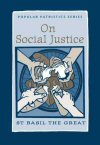
St. Basil’s homilies on the subject of wealth and poverty, although delivered in the fourth century, remain utterly fresh and contemporary. Whether you possess great wealth or have modest means, at the heart of St. Basil’s message stands the maxim: simplify your life, so you have something to share with others.
While some patristic texts relate to obscure and highly philosophical questions, St. Basil’s teachings on social issues are immediately understood and applicable. At a time when vast income disparity and overuse of limited environmental resources are becoming matters of increasing concern, St. Basil’s message is more relevant now than ever before.
There is no way to describe the power, simplicity, wisdom, and freedom of his words . . . you will think they were written yesterday—not 1,600 years ago! Precisely he describes our modern struggle with material wealth, our responsibility to our fellow man, and how to live a life in balance.
—Gregory P. Yova, from the foreword
Basil of Caesarea, also called Saint Basil the Great, (330 – January 1, 379) was the bishop of Caesarea Mazaca in Cappadocia, Asia Minor. He was an influential 4th century Christian theologian and monastic. Theologically, Basil was a supporter of the Nicene faction of the church, in opposition to Arianism on one side and the followers of Apollinaris of Laodicea on the other.
C. Paul Schroeder is an independent scholar and translator of early patristic texts. He resides in Portland, Oregon and is Proistamenos of Holy Trinity Greek Orthodox Cathedral there.
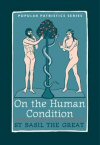
This informative and enjoyable volume serves as a valuable introduction to major themes in Greek Patristic anthropology—the image of God in the human form, the Fall of humanity, and the cause of evil—and brings together the main writings of St Basil the Great, fourth-century archbishop of Caesarea in Cappadocia, on these subjects. St. Basil deftly addresses the questions posed by the human condition with characteristic clarity and sobriety. He formulates a balance between humility grounded in our creation from the earth and confidence based on the dignity of being created according to God’s image.
In addition to two discourses on the creation of humanity, this volume includes Letter 233 to Amphilochius of Iconium, St. Basil’s spiritual son. It is a succinct and pointed discussion regarding the functions of the human mind, the activity for which God created it, and how it can be used for good, evil, or morally neutral purposes. This letter complements the discussion of emotions in St. Basil’s “Homily against Anger,” also included in this volume.
Finally, the book includes excerpts from St Basil’s fatherly instructions to his ascetic communities, commonly known as the “Long Rules” or the “Great Asceticon,” which emphasize the communal dimension of human identity: humans are naturally interrelated, social, and interdependent.
Basil of Caesarea, also called Saint Basil the Great, (330 – January 1, 379) was the bishop of Caesarea Mazaca in Cappadocia, Asia Minor. He was an influential 4th century Christian theologian and monastic. Theologically, Basil was a supporter of the Nicene faction of the church, in opposition to Arianism on one side and the followers of Apollinaris of Laodicea on the other.
Nonna Verna Harrison is assistant professor of church history at Saint Paul School of Theology in Kansas City, Missouri. Among the numerous theological articles she has authored is “Human Uniqueness and Human Unity,” in Abba: The Tradition of Orthodoxy in the West.
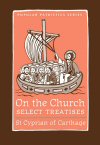
St. Cyprian, third-century bishop of Carthage, developed a theory of church unity almost universally accepted up to the European Reformation: to be a member of the body of Christ you needed to be in communion with a priest who was in communion with a bishop who in turn was in communion with all other bishops in the world. But, how could you discern who was a legitimate bishop? And, on what kind of issue would it be right to break off communion? Additionally, could self-authenticating ministries, like those of martyrs and confessors who had suffered for the faith, supersede this order? Finally, did the Church need, and in what form, a universal bishop who could guarantee the integrity of the network of bishops?
St. Cyprian wrestled with these questions in his letters and treatises. Each volume contains an introduction to the two principal controversies that spurred St. Cyprian to write his defense on church unity: first, the readmission to the Eucharist of those Christians who had lapsed or fallen in the persecution under Emperor Decius; and second, the sacramental validity of baptism in heretical and schismatic communities. This volume contains an introduction to the life and controversies of St. Cyprian. It includes the following treatises:
- To Donatus
- To Demetrian
- The Fallen (De Lapsis)
- The Unity of the Catholic Church (De catholicae ecclesiae unitate)
Cyprian of Carthage (AD 200–258) was an important early Christian writer. He was born in North Africa, received a classical education, and became a leading member of the legal fraternity in Carthage. He converted to Christianity as a middle-aged man and was baptized circa AD 245. Upon his baptism he gave a large portion of his wealth to the poor, among whom he was always popular. He became bishop of Carthage in AD 249. Under his leadership the Church in Carthage endured multiple periods of persecution. Cyprian consolidated his popularity with moderate, yet firm policies on reconciling recanters to the Church. In AD 256, a particularly severe wave of persecution called for the execution of all Christian clergy, culminating in Cyprian’s martyrdom in AD 258. A number of his pastoral epistles and treatises survive, including his most important work, On the Unity of the Church, in which he famously states “He can no longer have God for his father who has not the Church for his mother.”
Allen Brent is professor of early Christian history and literature at Edmund’s College, Cambridge.
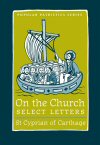
St. Cyprian, third-century bishop of Carthage, developed a theory of church unity almost universally accepted up to the European Reformation: to be a member of the Body of Christ you needed to be in communion with a priest who was in communion with a bishop who in turn was in communion with all other bishops in the world. But, how could you discern who was a legitimate bishop? And, on what kind of issue would it be right to break off communion? Additionally, could self-authenticating ministries, like those of martyrs and confessors who had suffered for the faith, supersede this order? Finally, did the Church need, and in what form, a universal bishop who could guarantee the integrity of the network of bishops?
St. Cyprian wrestled with these questions in his letters and treatises. Each volume contains an introduction to the two principal controversies that spurred St. Cyprian to write his defense on church unity: first, the readmission to the Eucharist of those Christians who had lapsed or fallen in the persecution under Emperor Decius; and second, the sacramental validity of baptism in heretical and schismatic communities. This volume contains various letters on the following subjects:
- The Crisis from the Decian Persecution
- The Unity of the Church and the Nature of Schism
- Controversies on the Eucharist and Baptism
- The End: Cyprian’s Account of His Final Days
Cyprian of Carthage (AD 200–258) was an important early Christian writer. He was born in North Africa, received a classical education, and became a leading member of the legal fraternity in Carthage. He converted to Christianity as a middle-aged man and was baptized circa AD 245. Upon his baptism he gave a large portion of his wealth to the poor, among whom he was always popular. He became bishop of Carthage in AD 249. Under his leadership the Church in Carthage endured multiple periods of persecution. Cyprian consolidated his popularity with moderate, yet firm policies on reconciling recanters to the Church. In AD 256, a particularly severe wave of persecution called for the execution of all Christian clergy, culminating in Cyprian’s martyrdom in AD 258. A number of his pastoral epistles and treatises survive, including his most important work, On the Unity of the Church, in which he famously states “He can no longer have God for his father who has not the Church for his mother.”
Allen Brent is professor of early Christian history and literature at Edmund’s College, Cambridge.
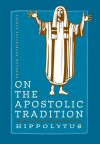
Apostolic Tradition, as this text is best known, was identified in the early years of the twentieth century as the work of Hippolytus, a Christian leader from third-century Rome. The text provides liturgical information of great antiquity, and as such has been massively influential on liturgical study and reform, especially in Western churches.
Nonetheless, there have been a number of problems surrounding the text. The attribution to Hippolytus has never been universally accepted; much of the text remained obscure, published without commentary; finally, no adequate English version has been published since 1937. On the Apostolic Tradition seeks to solve these problems. The introduction brings the debate concerning authorship to a new level while the rest of the text is accompanied by lucid commentary. Together with a fresh translation, the book brings light to formerly obscure passages, clears critical impasses, and provides new discoveries. It is a significant and important piece of research, enlightening and eminently readable.
Stewart-Sykes has produced a timely and highly significant contribution. . . . Unravel[s] the complexities . . . surrounding the foundational Western liturgy, and produce[s] a very compelling solution to the Hippolytan problems.
—Allen Brent, senior member, St. Edmund College, Cambridge
Hippolytus of Rome (AD 170–235) was perhaps the most important theologian of the third century. He was a presbyter of the Church of Rome, where he came into conflict with Popes Zephyrinus, Callixtus, and Urban I, and was elected as a rival bishop of Rome—thereby being considered by some as the first antipope. He was exiled to Sardinia in AD 235, and likely reconciled to the Church before his martyrdom later that year. He is venerated as a saint in the Roman Catholic, Eastern Orthodox, and Oriental Orthodox Churches. Philosophumena is considered his principal work, and he is also credited with the earliest Christian interpretation of the Song of Songs.
Alistair Stewart-Sykes is a leading scholar of Christian liturgical origins. The author of numerous books and articles on early Christianity and its liturgy, he had retired from teaching and is a vicar in the Diocese of Salisbury, England.
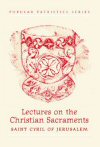
These six lectures on the Christian sacraments were delivered in Jerusalem in the middle of the fourth century. They belong to a period of rapid transition for the Church. Less than 40 years before, Christianity had been an illegal religion, the object of intense persecution. Now it was the favored religion of the state. Potential converts thronged to the shining new basilicas, built through the beneficence of Constantine and his successors. Catechetical instruction was needed. It was provided by gifted preachers and teachers like St. Cyril of Jerusalem.
The first of the lectures, the “procatechesis,” is a hearty welcome to the candidates for baptism and introduces them to the periods of doctrinal instruction which lies ahead. The remaining five, the “mystagogical catecheses,” are an exposition of the rites of Christian initiation—baptism, chrismation, and the Eucharist—for the newly baptized. A rich source of information on the history and worship of the fourth century, the lectures remain a source of instruction and inspiration. The present edition, with its scholarly introduction and Greek text as well as its eminently readable English translation, makes this remarkable text available to the specialist and non-specialist alike.
Cyril of Jerusalem (Greek Κύριλλος Α΄ Ἱεροσολύμων) was a distinguished theologian of the early Church (ca. 313–386). He is venerated as a saint by the Roman Catholic Church, the Eastern Orthodox Church, and the Anglican Communion. In 1883, Cyril was declared a doctor of the Church by Pope Leo XIII. He is highly respected in the Palestinian Christian Community.
F.L. Cross was Lady Margaret Professor of Divinity in the University of Oxford and Canon of Christ Church from 1944–1968. He did crucial academic work on the African biblical canons and early liturgy.
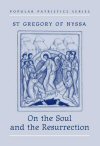
In the fourth century, the Christian church emerged from the catacombs as a spiritual and intellectual force, and many believers struggled to explain their faith within prevailing philosophical systems. Among them was St. Gregory, bishop of Nyssa, who examined the doctrine of the bodily resurrection.
Following Plato’s literary example, St. Gregory wrote a dramatic dialogue regarding the soul and the resurrection, in which he plays the role of “pupil,” while his elder sister, St. Macrina, assumes the role of “teacher.” The lively dialogue addresses many thorny issues—the nature of the soul, the condition of the soul after death, and the transmigration of the soul—and concludes with a position corresponding to the writings of the Apostle Paul. St. Gregory’s adherence to Scripture in the context of his philosophical milieu provides contemporary readers with a superb example of Christianity encountering culture.
St. Gregory of Nyssa (c. 335 – after 394) was a Christian bishop and saint. He was a younger brother of Basil the Great and a good friend of Gregory of Nazianzus. His significance has long been recognized in the Eastern Orthodox, Oriental Orthodox, Eastern Catholic and Roman Catholic branches of Christianity. Some historians identify Theosebia the deaconess as his wife, others hold that she, like Macrina the younger, was actually a sister of Gregory and Basil.
Catherine P. Roth is an adjunct instructor in philosophy at Spokane Community College and Spokane Falls Community College.
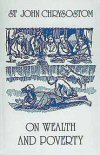
The sermons of St. John Chrysostom are noted as classical commentaries on the Christian life. Knowing well the realities of life in the world, the temptations of rich and poor alike, this great orator—“the golden-mouthed”—addresses the questions of wealth and poverty in the lives of people of his day. And yet, as the modern reader is confronted with his words, it becomes apparent that he too is being addressed; Chrysostom’s words are words proclaiming the truth of the gospel to all people of all times. The message of the story of the rich man and Lazarus (Luke 16:19–31) is brought home to every person in these six sermons of Chrysostom with clarity, insight into the human dilemma, compassion, and judgment.
John Chrysostom, archbishop of Constantinople, was an important Early Church Father. He is known for his eloquence in preaching and public speaking, his denunciation of abuse of authority by both ecclesiastical and political leaders, the Divine Liturgy of St. John Chrysostom, and his ascetic sensibilities. After his death (or, according to some sources, during his life) he was given the Greek surname chrysostomos, meaning “golden mouthed,” rendered in English as Chrysostom.
Catherine P. Roth is an adjunct instructor in philosophy at Spokane Community College and Spokane Falls Community College.
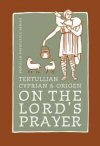
These are the only three existing ante-Nicene treatises on the Lord’s Prayer, and they became the starting point for many other commentaries. Of the three, however, only the discourse of Cyprian is an address to catechumens. Tertullian’s treatise contains additional material on the conduct of worship and on prayer in the assembly, and Origen’s commentary is a vast work on the whole subject of prayer, as much suited to advanced learners in the school of Christ as to those preparing for baptism.
Alistair Stewart-Sykes has provided us herein with very readable, accurate, and generally inclusive translations of these three great spiritual classics in a way that should appeal to all readers. What is more, by means of his helpful introductions and notes, he has placed these works in their respective historical/liturgical/theological contexts. This volume merits wide use and readership in several different environments, from general reading to parish education sessions to the university and seminary classroom.
—Maxwell E. Johnson, professor of liturgical studies, University of Notre Dame
Quintus Septimius Florens Tertullianus, anglicised as Tertullian (c. 160–220 AD), was a prolific early Christian author from Carthage in the Roman province of Africa. He is the first Christian author to produce an extensive corpus of Latin Christian literature. He also was a notable early Christian apologist and a polemicist against heresy. Tertullian has been called “the father of Latin Christianity” and “the founder of Western theology.
Saint Cyprian was bishop of Carthage and an important early Christian writer, many of whose Latin works are still extant. He was born circa the beginning of the 3rd century in North Africa, perhaps at Carthage, where he received a classical education. After converting to Christianity, he became a bishop (249) and eventually died a martyr at Carthage.
Origen (c. 182–251) was a Christian scholar and theologian and one of the most distinguished of the fathers of the early Christian Church. He is thought to have been born at Alexandria, and died at Caesarea. His writings are important as the first serious intellectual attempt to describe Christianity.
Alistair Stewart-Sykes is a leading scholar of Christian liturgical origins. The author of numerous books and articles on early Christianity and its liturgy, he had retired from teaching and is a vicar in the Diocese of Salisbury, England.
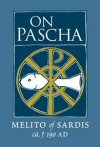
The Quartodecimans were early Christians who maintained the tradition derived from Judaism, and observed Pascha on the same occasion that the Jews observed Passover. In this work, Alistair Stewart-Sykes, the leading authority on Melito and the Quartodecimans, presents a unique collection of material in a format ideal for classroom use as well as for the general reader.
At the head of this collection stands a new translation of On Pascha by Melito of Sardis, a liturgical work deriving from Quartodeciman circles in Asia. Alongside this is an extensive introduction and annotation pointing out not only the parallels to Jewish practice, but also offering an analysis of the work in terms of classical rhetoric. In addition, the translator has included a selection of Melito’s fragments, testimonies to Melito, and other material vital for understanding the Quartodeciman liturgies from Rome, Syria, and Asia. All texts are translated, described, and discussed.
Melito of Sardis (died c. AD 180) was the bishop of Sardis, and a highly influential early church leader. He published widely, though most of his work survives in fragments. His celebrated but untitled apology, written in AD 161, was addressed to Marcus Aurelius.
Alistair Stewart-Sykes is a leading scholar of Christian liturgical origins. The author of numerous books and articles on early Christianity and its liturgy, he had retired from teaching and is a vicar in the Diocese of Salisbury, England.
Reviews
9 ratings

Rt Rev. Benedict Churchill, Ph.D.
9/24/2014

G
3/26/2014
FrMoses
12/22/2013
V. Rev. K. Michael Anderson
12/13/2013

Faithlife User
10/9/2013
Elias Stevens
8/25/2013

Walter H. Davis Sr
8/21/2013

Winston F Cabading OP
8/8/2013
John Vignol
7/12/2013